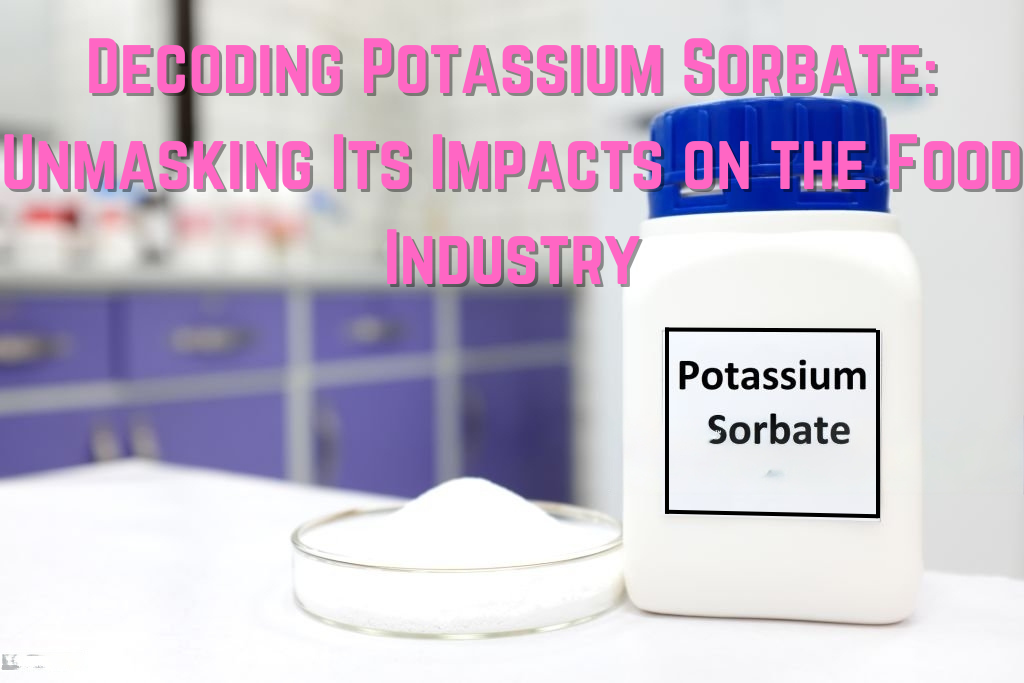Effects of Potassium Sorbate
Effects of Potassium Sorbate in Food Production
Potassium Sorbate is a common food preservative that plays a pivotal role in the realm of food production. Also, the effects of Potassium Sorbate are primarily centred around its ability to block the growth of various molds, yeasts, and fungi that can spoil food.
In addition, this makes it a valuable asset in increasing the shelf life of a wide array of food products, ranging from baked goods to sauces and beverages. Its inclusion in food production not only ensures the safety and longevity of consumables but also reduces food wastage.
Additionally, Potassium Sorbate is known for its neutral taste, the effects of Potassium Sorbate doesn’t alter the flavour profile of the products it preserves. Sodium Benzoate shares a similar role in food production. Understanding its role in food production is essential for both manufacturers and consumers, as it contributes significantly to maintaining the quality and safety of the food supply.
Potassium Sorbate: Functions and Applications in Food Industry
In the food industry, understanding the effects of Potassium Sorbate is crucial. This compound serves as a powerful preservative, effectively inhibiting the growth of molds, yeasts, and fungi. Its significance lies in prolonging the shelf life of various food products.
From bakery items to sauces and beverages, Potassium Sorbate acts as a shield, ensuring the safety and quality of consumables. What sets it apart is its ability to accomplish this without altering the taste. This neutral attribute makes it a preferred choice among food manufacturers.
Its applications are widespread, effects of Potassium Sorbate is indispensable in preventing spoilage and reducing food waste. The food industry commonly uses yeast extract to enhance flavor and provide nutritional benefits. For those in the food industry, comprehending the functions of Potassium Sorbate is pivotal for maintaining product integrity and meeting quality standards.
Regulatory Guidelines and Safety Standards for Potassium Sorbate
In the food industry, adherence to regulatory guidelines and safety standards regarding Potassium Sorbate is of paramount importance. This compound, widely used as a preservative, must meet stringent criteria to ensure consumer safety. Regulatory bodies have set specific limits on its usage, taking into account its effects on human health.
These guidelines dictate the permissible levels of Potassium Sorbate in various food products to prevent any potential harm. Additionally, it’s crucial for manufacturers to accurately label products containing this preservative, providing consumers with transparent information.
Rigorous quality checks and adherence to safety protocols are imperative in maintaining compliance with these standards. Additionally, regulatory authorities subject propyl gallate, another commonly used food preservative, to oversight. By strictly following these regulatory measures, the food industry upholds the integrity and safety of products containing Potassium Sorbate, offering consumers confidence in the items they consume.
Debunking Myths: Addressing Common Concerns about Potassium Sorbate
Addressing concerns and dispelling myths about the effects of Potassium Sorbate is essential for informed decision-making in food consumption. Some misconceptions surround this food preservative, leading to unwarranted worries. One common misconception is that Potassium Sorbate is harmful in prescribed amounts.
However, regulatory bodies meticulously determine safe levels for consumption, ensuring it poses no harm when used appropriately. Additionally, there is a belief that it alters the taste of food. Quite the contrary, Potassium Sorbate is known for its neutral flavour, making it an ideal choice for preserving a wide array of food products without compromising their taste.
By providing accurate information and clarifying these misconceptions, consumers can appreciate the vital role Potassium Sorbate plays in maintaining the safety and quality of various food items.
Alternatives and Best Practices in Food Preservation
Looking into other ways to preserve food gives us useful ideas beyond using Potassium Sorbate. Natural preservatives like rosemary extract, citric acid, and vinegar are becoming more popular because they work well and don’t change the taste much.
Furthermore, high-pressure processing and modified atmosphere packaging enhance food safety without synthetic preservatives. Proper storage, temperature control, and moisture regulation are vital. Additionally, vacuum sealing and canning are proven ways to extend shelf life.
Furthermore, encouraging reduced food waste through mindful consumption practices adds to sustainable food preservation efforts. By expanding preservation methods and adopting these best practices, the food industry can provide consumers with a broader selection of safe, less processed choices, all while lessening the dependence on synthetic preservatives such as Potassium Sorbate.
Conclusion: Balancing Potassium Sorbate Usage for Safe and Sustainable Food Processing
In summary, finding the right way to use Potassium Sorbate is important for safe and sustainable food processing. While it’s essential for preserving many food products and making them last longer, it’s crucial to follow the rules and safety standards set by authorities.
Knowing how Potassium Sorbate works helps manufacturers make informed choices about when to use it. Additionally, looking into other ways to preserve food and following best practices can reduce the need for artificial preservatives.
By using natural preservatives and advanced preservation methods, the food industry can provide consumers with more options that are less processed. Embracing these approaches not only makes food safer but also makes the food processing industry more environmentally friendly and sustainable.



